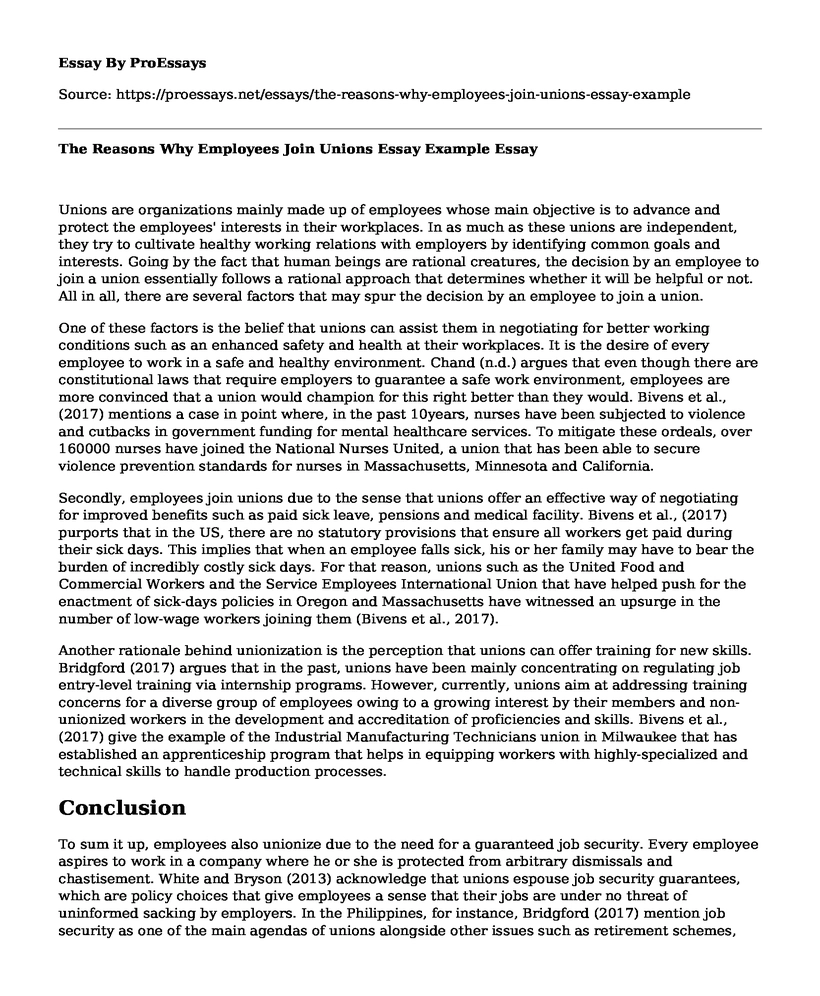Unions are organizations mainly made up of employees whose main objective is to advance and protect the employees' interests in their workplaces. In as much as these unions are independent, they try to cultivate healthy working relations with employers by identifying common goals and interests. Going by the fact that human beings are rational creatures, the decision by an employee to join a union essentially follows a rational approach that determines whether it will be helpful or not. All in all, there are several factors that may spur the decision by an employee to join a union.
One of these factors is the belief that unions can assist them in negotiating for better working conditions such as an enhanced safety and health at their workplaces. It is the desire of every employee to work in a safe and healthy environment. Chand (n.d.) argues that even though there are constitutional laws that require employers to guarantee a safe work environment, employees are more convinced that a union would champion for this right better than they would. Bivens et al., (2017) mentions a case in point where, in the past 10years, nurses have been subjected to violence and cutbacks in government funding for mental healthcare services. To mitigate these ordeals, over 160000 nurses have joined the National Nurses United, a union that has been able to secure violence prevention standards for nurses in Massachusetts, Minnesota and California.
Secondly, employees join unions due to the sense that unions offer an effective way of negotiating for improved benefits such as paid sick leave, pensions and medical facility. Bivens et al., (2017) purports that in the US, there are no statutory provisions that ensure all workers get paid during their sick days. This implies that when an employee falls sick, his or her family may have to bear the burden of incredibly costly sick days. For that reason, unions such as the United Food and Commercial Workers and the Service Employees International Union that have helped push for the enactment of sick-days policies in Oregon and Massachusetts have witnessed an upsurge in the number of low-wage workers joining them (Bivens et al., 2017).
Another rationale behind unionization is the perception that unions can offer training for new skills. Bridgford (2017) argues that in the past, unions have been mainly concentrating on regulating job entry-level training via internship programs. However, currently, unions aim at addressing training concerns for a diverse group of employees owing to a growing interest by their members and non-unionized workers in the development and accreditation of proficiencies and skills. Bivens et al., (2017) give the example of the Industrial Manufacturing Technicians union in Milwaukee that has established an apprenticeship program that helps in equipping workers with highly-specialized and technical skills to handle production processes.
Conclusion
To sum it up, employees also unionize due to the need for a guaranteed job security. Every employee aspires to work in a company where he or she is protected from arbitrary dismissals and chastisement. White and Bryson (2013) acknowledge that unions espouse job security guarantees, which are policy choices that give employees a sense that their jobs are under no threat of uninformed sacking by employers. In the Philippines, for instance, Bridgford (2017) mention job security as one of the main agendas of unions alongside other issues such as retirement schemes, healthcare benefits and wage increase. Bivens et al., (2017) points out the case of the United States where workers currently have less job security than three decades ago. Nonetheless, unionized employees in the US enjoy an improved job security compared to non-unionized employees.
References
Bivens, J., Engdahl, L., Gould, E., Kroeger, T., McNicholas, L. M., Mokhiber, Z., ... & Zipperer, B. (2017). How Today's Unions Help Working People: Giving Workers the Power to Improve Their Jobs and Unrig the Economy. Washington, DC: Economic Policy Institute.
Bridgford, J. (2017). Trade union involvement in skills development: an international review. Retrieved from https://www.ilo.org/wcmsp5/groups/public/---ed_emp/---ifp_skills/documents/publication/wcms_585697.pdf
Chand, S. Why do Workers Join a Trade Union? (Reasons). Retrieved from http://www.yourarticlelibrary.com/trade-unions/why-do-workers-join-a-trade-union-reasons/35468
White, M., & Bryson, A. (2013). Job cuts, job guarantees and unions. The Manchester School, 81(6), 855-875.
Cite this page
The Reasons Why Employees Join Unions Essay Example. (2022, Oct 25). Retrieved from https://proessays.net/essays/the-reasons-why-employees-join-unions-essay-example
If you are the original author of this essay and no longer wish to have it published on the ProEssays website, please click below to request its removal:
- Paper Example on Transport Industry: An Understanding of the Industry and What I Have Learned
- From Baby Steps to Olympic Strides: Personal Essay About Success
- Paper Example on Marketing Mix
- The Engineering and Construction Career Path: Where to Begin?
- Essay Example on Mental Health, Workplace Safety and the ILO: Exploring a Vital Link
- Essay Sample on Nonprofit Trade Organization Facing Demographic & Economic Shifts for Strategic Planning
- Ads: A Powerful Tool for Critical Thinking & Argumentation - Essay Sample







